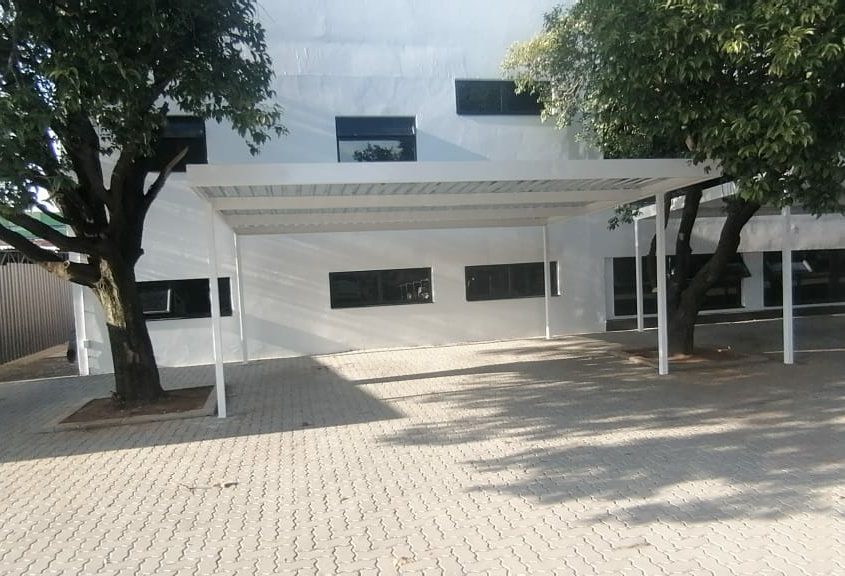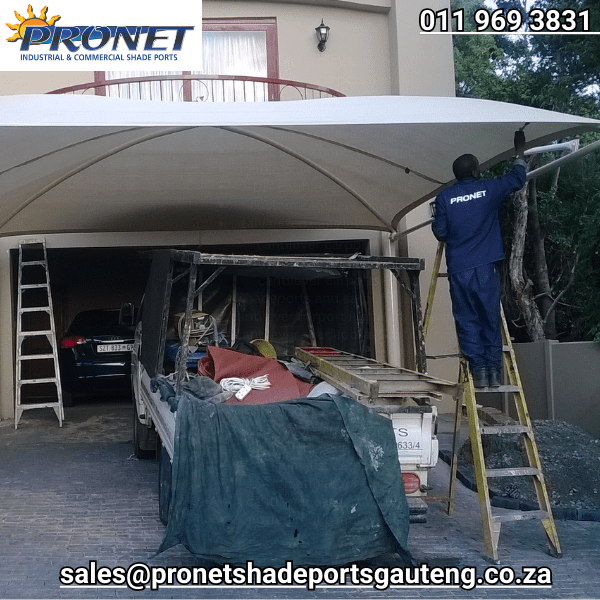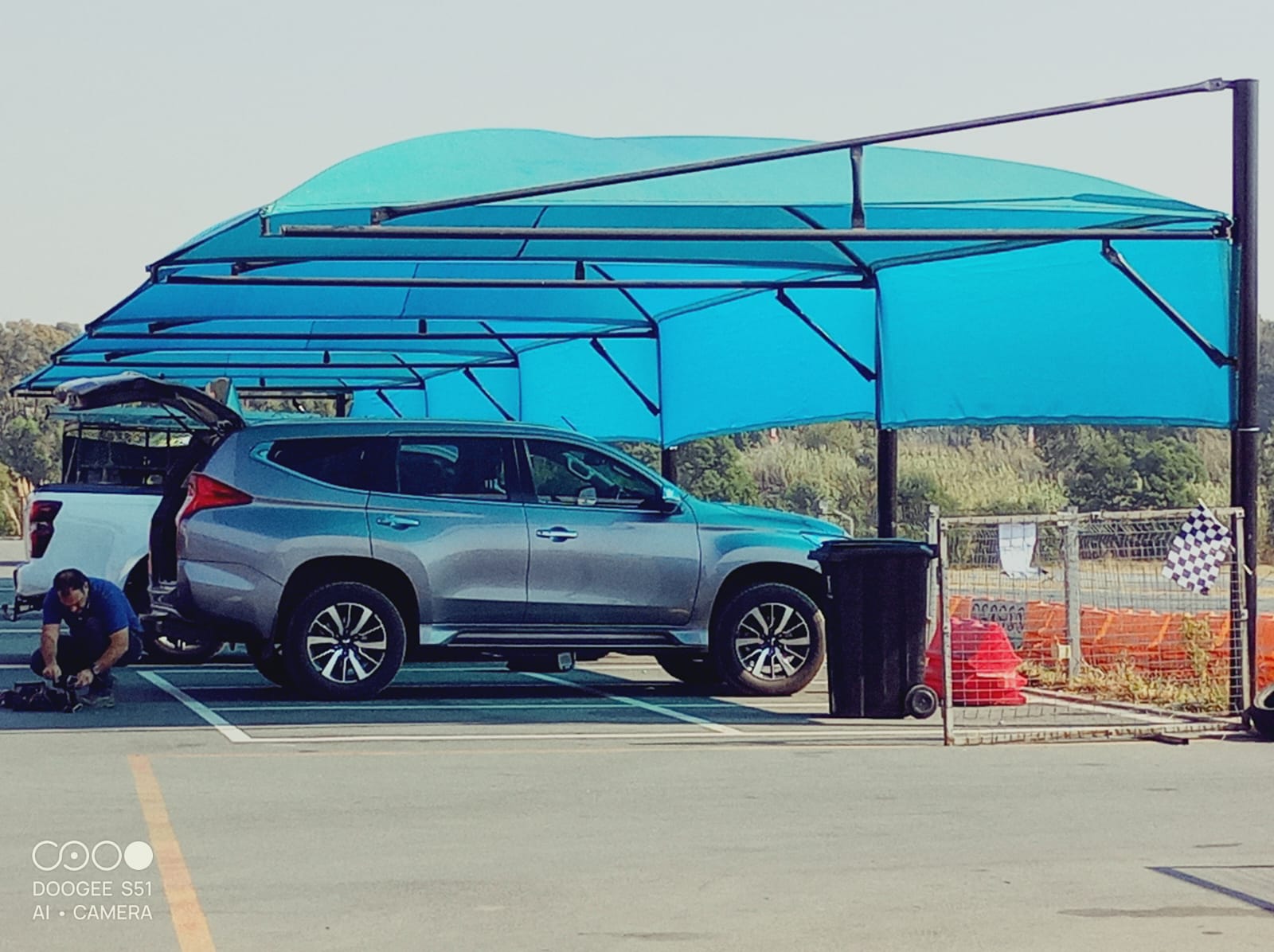Key Takeaways
| Cost Factor | Price Range | Details |
|---|---|---|
| Basic Shade Net Carport | R8,000 – R15,000 | Single car, standard materials |
| Metal/Aluminium Carport | R18,000 – R35,000 | Single car, IBR sheeting |
| Premium Carports | R40,000 – R60,000+ | Double car, polycarbonate, cantilever |
| Installation | R2,000 – R8,000 | Varies by complexity and location |
| Permits | R500 – R2,500 | Council approval costs |
Carport costs in South Africa range from R8,000 for basic shade net structures to over R60,000 for premium double carports with polycarbonate roofing. Most homeowners spend between R15,000-R35,000 for a quality single-car metal carport including installation.
Carport prices in South Africa depend on size, materials, and design complexity. A basic single-car shade net carport starts around R8,000, while premium double carports with polycarbonate roofing can exceed R60,000. Most South African homeowners invest between R15,000-R35,000 for a durable metal carport that protects their vehicle properly.
Pronet Shadeports specialises in custom carport solutions across Gauteng, offering everything from affordable shade net structures to premium cantilever designs. Our services cover Johannesburg, Pretoria, Centurion, and Midrand, with expert installation teams handling projects from residential driveways to commercial parking areas. We provide comprehensive quotes that include materials, labour, and council approval assistance where needed.
Understanding Carport Material Costs
Different materials create significant price variations in carport construction. Shade net carports offer the most budget-friendly option, typically costing R8,000-R15,000 for single-car coverage. These structures use high-density polyethylene fabric stretched over galvanised steel frames, providing excellent UV protection whilst maintaining airflow.
IBR (Inverted Box Rib) sheeting represents the most popular and cost-effective metal roofing choice. This corrugated steel material costs approximately R120-R180 per square metre and offers excellent weather protection. IBR sheeting carports typically range from R18,000-R28,000 for single-car installations, depending on frame specifications and powder coating options.
Polycarbonate roofing delivers premium aesthetics with natural light transmission properties. These translucent panels cost R300-R500 per square metre but create bright, welcoming spaces underneath. Polycarbonate carports start around R25,000 for single-car structures and can reach R45,000+ for larger installations. The material’s durability and UV resistance justify the higher investment for many homeowners.
Solar carport options represent the latest innovation, integrating photovoltaic panels into the roof structure. These systems significantly increase costs to R80,000-R150,000+ but provide long-term energy savings. Solar carports require specialised mounting systems and electrical connections, making professional installation essential.
Single vs Double Carport Pricing
Single-car carports measure approximately 3m x 6m and suit most residential needs perfectly. Basic shade net versions cost R8,000-R12,000, whilst metal alternatives range from R15,000-R25,000. These compact structures fit easily into suburban driveways without overwhelming property aesthetics.
Double carports (6m x 6m or larger) accommodate two vehicles but cost significantly more than twice the single-car price. Material requirements increase substantially, and structural engineering becomes more complex. Expect double carport prices from R25,000 for shade net designs up to R60,000+ for premium metal constructions.
The middle ground option involves tandem carports – single-width structures extended to 9-10 metres length. These designs work well for narrow properties where side-by-side parking isn’t feasible. Tandem carports typically cost 40-60% more than standard single-car versions whilst using less material than full double carports.

How Much Does a Carport Cost in South Africa?
Custom sizing affects pricing substantially. Non-standard dimensions require bespoke engineering and often generate material waste. Adding just one metre to standard carport dimensions can increase costs by R3,000-R5,000 due to structural modifications and custom fabrication requirements.
Design Variations and Their Cost Impact
Cantilever carports feature unique support structures with posts positioned away from vehicle parking areas. This design eliminates centre posts that might interfere with car doors but requires stronger engineering. Cantilever structures typically cost 25-40% more than standard designs due to increased material requirements and structural complexity.
Flat roof carports offer the most economical construction method, using minimal materials and simple installation techniques. However, proper drainage becomes crucial to prevent water pooling. Pitched roof designs cost approximately 15-20% more but provide superior weather protection and aesthetic appeal.
Gable-end carports incorporate triangular roof sections that enhance visual appeal whilst improving structural strength. These designs suit traditional home styles but require additional materials and labour. Gable-end additions typically add R3,000-R6,000 to standard carport costs.
Curved roof carports create striking architectural features but demand specialised materials and installation expertise. Curved designs can increase costs by 30-50% compared to standard pitched roofs. These premium structures work particularly well with contemporary home designs where visual impact matters most.
| Design Type | Cost Increase | Best For |
|---|---|---|
| Standard Pitched | Baseline | Most applications |
| Flat Roof | -10% to -15% | Budget builds |
| Cantilever | +25% to +40% | Tight spaces |
| Gable End | +20% to +30% | Traditional homes |
| Curved | +30% to +50% | Modern architecture |
Installation and Labour Costs
Professional installation typically adds R2,000-R8,000 to carport projects, depending on complexity and location accessibility. Simple shade net installations might cost just R1,500-R2,500 in labour, whilst complex cantilever structures can require R6,000-R10,000 in professional services.
Foundation requirements significantly impact installation costs. Concrete footings for metal carports typically cost R500-R1,200 per post, depending on soil conditions and local council requirements. Some areas require engineered foundations due to wind loads or unstable ground conditions.
Site preparation affects labour costs substantially. Level sites with easy access keep installation simple and affordable. Sloped properties or areas requiring excavation can double installation timeframes and costs. We always conduct site surveys before providing final quotes to identify potential complications.
Location-based installation complexity varies across Gauteng. Carport installations in Johannesburg might face different challenges compared to Centurion projects. Urban areas often have restricted access for delivery vehicles, whilst suburban locations might have underground utilities requiring careful excavation.
Powder coating for rust prevention adds R1,500-R3,500 to steel carport costs but extends lifespan significantly. This factory-applied finish provides superior protection compared to paint and maintains appearance longer. Most quality carport manufacturers include powder coating as standard on premium products.
Regional Price Variations Across South Africa
Gauteng carport prices typically represent the national average due to competitive market conditions and material availability. Shadeports Gauteng installations benefit from proximity to steel manufacturing centres and established supply chains.
Carport prices in Pretoria often run slightly lower than Johannesburg due to reduced transport costs and competitive local suppliers. The capital city’s suburban layout also provides easier installation access, reducing labour complications.
Rural areas face higher costs due to transport surcharges and limited installer availability. Remote locations might add 15-25% to standard pricing, particularly for complex installations requiring multiple site visits. Material delivery to distant locations also incurs additional charges.
Coastal regions deal with corrosion challenges requiring upgraded materials and protective coatings. Galvanised steel specifications must meet marine environment standards, potentially increasing material costs by 10-20%. Proper material selection becomes crucial for long-term durability near ocean environments.
| Region | Price Variation | Key Factors |
|---|---|---|
| Johannesburg | Baseline | Competitive market |
| Pretoria | -5% to -10% | Lower transport costs |
| Midrand | Similar to JHB | Good access, competition |
| Centurion | -5% to -8% | Suburban efficiency |
| Rural Areas | +15% to +25% | Transport, limited suppliers |
Council Approval and Permit Costs
Most South African municipalities require building plan approval for permanent carport structures. Council approval requirements vary by area but typically cost R500-R2,500 depending on structure size and complexity.
Building plan submission usually requires architectural drawings and structural calculations. Professional drawing services cost R1,500-R4,000 for standard carports, whilst engineer certifications add R2,000-R5,000 for complex structures. These upfront costs prevent future legal complications and ensure structural safety.
Temporary or removable carports sometimes avoid permit requirements, but permanent installations almost always need approval. Council processing times range from 2-8 weeks, so planning ahead prevents project delays. Some municipalities offer expedited services for additional fees.
Property line setbacks affect carport placement and might require boundary wall modifications. Standard setback requirements range from 1-3 metres depending on local bylaws. Violating setback rules can result in expensive modifications or complete structure removal.
We assist customers with permit applications and maintain relationships with local councils across our service areas. This expertise streamlines approval processes and ensures compliance with all relevant building codes and safety standards.
Premium Features and Add-ons
Integrated lighting systems enhance carport functionality whilst adding R2,000-R5,000 to project costs. LED strip lighting along roof edges provides excellent illumination for evening vehicle access. Motion sensors add convenience whilst reducing electricity consumption.
Built-in storage solutions maximise carport utility beyond vehicle protection. Wall-mounted cabinets, tool racks, and bicycle storage cost R1,500-R4,000 depending on specifications. These additions work particularly well in double carports where extra space exists.
Automated systems like remote-controlled gates or retractable sides create premium carport experiences. Electric gate systems start around R8,000 whilst retractable weather panels cost R5,000-R12,000. These features suit high-end residential applications where convenience justifies additional investment.
Side panels provide enhanced weather protection but increase material and installation costs. Partial panels covering prevailing wind directions cost R3,000-R6,000, whilst full enclosure systems can add R8,000-R15,000 to basic carport prices. Panel materials range from shade cloth to clear polycarbonate.
Guttering and downpipes manage rainwater effectively whilst protecting foundation areas. These additions cost R1,200-R2,500 but prevent erosion problems and allow rainwater harvesting. Proper drainage extends carport lifespan whilst protecting surrounding landscaping.
Frequently Asked Questions
How long does carport installation take?
Most standard carports require 1-3 days for installation, depending on size and complexity. Simple shade net structures often complete in one day, whilst premium metal carports with concrete foundations might need 2-3 days. Weather conditions and site accessibility affect installation timeframes.
Do carports add value to property?
Quality carports typically add 60-80% of their installation cost to property values. Buyers appreciate covered parking, especially in areas with harsh weather conditions. Premium materials and professional installation maximise value addition compared to basic DIY structures.
What maintenance do carports require?
Well-built carports need minimal maintenance beyond annual cleaning and inspection. Check bolts for tightness, clear gutters of debris, and inspect for any damage. Powder-coated steel structures might need touch-up painting every 8-10 years in high-corrosion environments.
Can carports be relocated?
Bolt-together carports can often be dismantled and relocated, though some components might need replacement. Shade net structures relocate more easily than concrete-footed metal carports. Factor in dismantling, transport, and reinstallation costs when considering relocation.
What warranty comes with professional carport installation?
Reputable installers provide 12-24 month workmanship warranties, whilst material warranties vary by manufacturer. Steel frames typically carry 10-15 year structural warranties, whilst shade cloth might have 5-8 year UV degradation coverage. Always confirm warranty terms before finalising installation contracts.




